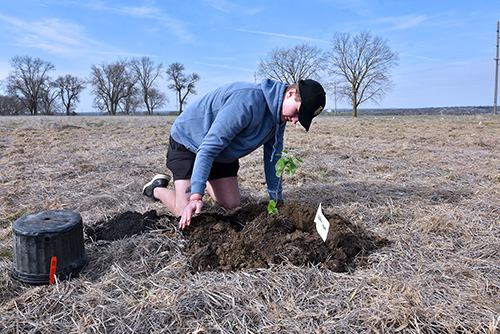NORFOLK, Neb. – Things are falling into place at the new Urban Agriculture farm at Northeast Community College. Prior to the end of the spring semester, several students in various ag programs spent time planting over 100 trees and shrubs on the 10-acre site located on the east side of North Victory Road, across from the college’s main campus in Norfolk.
The site, designed by Agriculture-Horticulture Instructor Trentee Bush, is considered a Community Food Forest. The trees and shrubs come from a Community Forestry Assistance program grant through the Lower Elkhorn Natural Resources District. The program provides both technical assistance and cost-share assistance for tree planting projects to improve or renovate community green spaces on public lands.
“Because trees take a long time to establish, we wanted to get those started on the urban farm first,” Bush said. “And this is just a great opportunity for the students to learn how to plant trees and shrubs properly and manage organizing the inventory of each tree as we go so we have history to keep track of them.”
Horticulture and Golf Course Management students performed most of the planting, under Bush’s guidance as well as Sarah Sellin, a former Natural Resources Conservation Service employee, who is Northeast’s Natural Resources instructor. Northeast’s Precision Ag Trainer Courtney Nelson and Adam Wachter, a Precision Ag Technology instructor, worked with students who used an auto-steer tractor with GIS (geographic information system) tracking to line up the rows and a precision ag software to label each tree with a geo tag.
“So now we have all the data on when the trees and shrubs were planted, their varieties and their exact locations so that over time we can get pictures and see how they grow,” said Jill Heemstra, director of agriculture programs at Northeast. “We've also had our precision ag trainer and students out there mapping the boundaries to make sure our rows are straight and equally spaced.”
The intent of the site is to establish it so continual changes may be made over time like someone’s backyard. That may include changing it from year to year to make it a living-learning space. Eventually, the urban farm will be an educational and interactive site to be used by more than just the college community.
“This site where the trees have been planted feature edible fruits and nuts that will be open to the public when they start producing,” Bush said. “This will allow people to come out and not only learn a little bit about each tree, but they can also use it for food security.”
Now with the trees planted, additional work will take place this summer on the urban farm. A buffalo grass demonstration area will be established that will include a cost compact analysis to demonstrate the effectiveness of using seeds or plugs when establishing a more native lawn. Additionally, approximately
10 tons of manure and wood chips will be delivered to begin composting and to create some raised beds. This fall, Northeast’s irrigation instructor will be installing an irrigation system which will allow Horticulture and Golf Course Management students to install low flow irrigation. Permeable pavers will also be installed for a parking area on the site.
Grants from the National Science Foundation and the USDA Natural Resources Conservation Service have assisted with startup costs of the Urban Agriculture degree program at Northeast. The urban ag concentration intended for students who live in urban and suburban environments to increase their skills in food productivity and storage as well as general knowledge and care of the living world around them. There is a focus on growing in small spaces, using regenerative practices, and exploring the connections in a biodiverse world. Electives may include classes in landscape design or other areas in which the student has a special interest.
Students in the program will continue to join others in utilizing the urban farm. Heemstra said having different ag programs work on the project is critical to developing it into a sustainable project.
“It takes a whole lot of different kinds of expertise to really plan and implement this kind of project,” she said. “It just speaks to how well our faculty work together, how they respect each other's knowledge and expertise as they seek each other out and work together.”
“There will always be something new to learn on this site among our instructors as well,” Bush added.
--###--
PHOTO CUTLINE
Jaden Krenzer moves soil around a newly planted tree on Northeast’s Community College’s Urban Agriculture farm on the Norfolk campus. Krenzer, a Horticulture and Golf Course Management major from Springfield, was among several ag students who planted over 100 trees and shrubs on the 10-acre site prior to the end of the spring semester.

